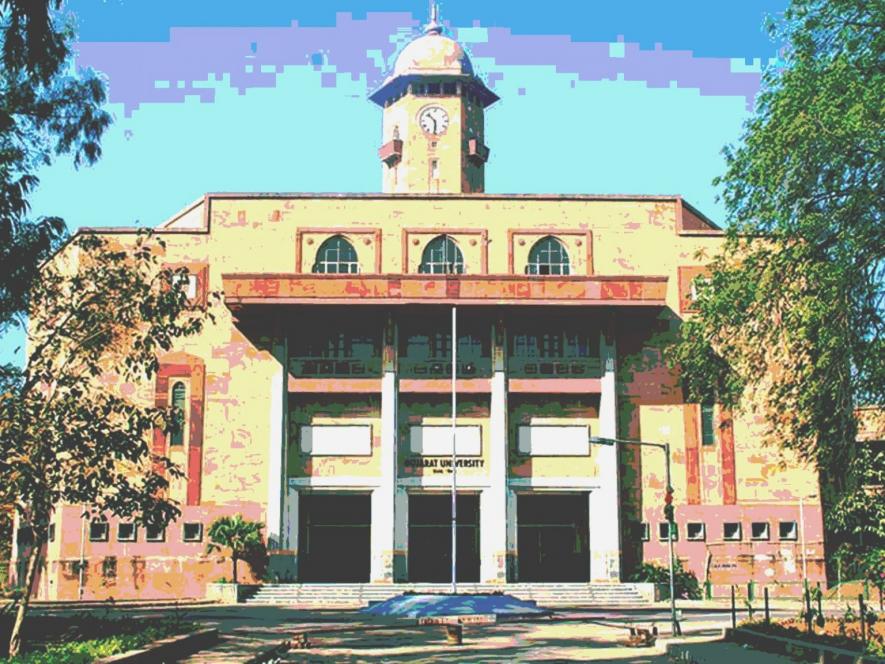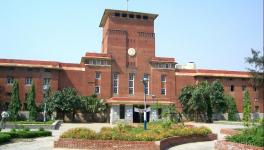NEP in Action: The Dismantling of Democracy in Gujarat University

In September 2020, Vijay Rupani, Chief Minister of Gujarat, announced that his state would be first to implement the much chagrined National Education Policy (NEP).
This task has been taken up post haste with the formation of committees and submission of their reports in a matter of months. Late last year the state government decided to shut down and merge thousands of schools in the state. With the term of a majority of elected members of the Gujarat University (GU) Senate (and by extension the Syndicate)1 expiring on 26 February 2021 and no date for elections having been announced, it would seem that the government has now trained its guns on public higher education. It is seeking to replace the democratic, representative statutory bodies with what the NEP, in its corporate language calls “effective governance and leadership” provided by a Board of Governors.
The struggle for democratising of Gujarat University
Bodies such as the Senate and the Syndicate (the names may vary according to different universities) have been have been a fundamental part of Indian universities since their inception in 1857. Recognised as the primary legislative bodies of the University, they are also tasked with making important administrative decisions.
The Senate of GU which is today under attack, as well as similar bodies at other universities at present, differ greatly from their 19th century counterparts, both in their structure, and the process of appointments. The present Senate consists of ex-officio and elected members who represent the views of various sections including the government, teachers, students, non-teaching staff, college managements and the wider community of which the university is a part. The Senate, among its other functions, also elects some members to the Syndicate and votes to elect the Vice Chancellor of the university. The democratic and representative form in which these bodies exist today was, however, not always the case but had to be fought for by progressive sections of the university body. In the case of GU this battle took place between 1962 and 1973, a period that had witnessed rampant commercialisation of education.
At the time of its establishment in 1949 the GU Senate, included teachers, ex-officio government officers and significantly no students but all Principals of affiliated colleges. Between 1960 and 1970 there was a proliferation of colleges under private management that sought to take advantage of the government’s liberal grant-in-aid policy and private colleges in the state (not all affiliated to GU) increased from 69 to 205. Chimanbhai Patel, who was overthrown by the student led Navnirman Agitation in 1974, was a primary actor in the commercialisation of education in Gujarat in the 1960s. With the establishment of newer colleges, the number of principals who were members of the Senate by 1970 became 131 out of a total of 254 members. Compared this, the number of teachers’ representatives remained at 28, the same as 1949. Alongside this, the working conditions, job security and pay scales in these new colleges were often not up to the mark. However, with there being a predominant representation for college managements, taking up these matters inside the Senate was impossible.
Suffering under these conditions, it was teachers’ organisations like the Gujarat University Area Teachers’ Association and student organisations like the Pragatisheel Vidyarthi Sangh that demanded amendments to the University Act that would ensure better representation. Sustained pressure led to the formation of a government Commission to “modernise” the acts which in its report made progressive recommendations severely criticising the “disproportionate representation” of private colleges through Principals. However, with vested interested in higher education unwilling to give in and utilising vindictive retrenchments of teachers, it took multiple hunger strikes, protest demonstrations, boycott of examinations as well as refusal to check answer sheets before an Amendment Act was passed by the government. The Act incorporated a large number of recommendations that had been made by the Commission. It reduced the total number of members from over 250 to 146, limiting the number of seats for principals to 35, increasing the seats for teachers to 48, and one of the first times or probably even the first in India, provided for 12 elected student representatives in the Senate. Stories abound of such battles fought and won for the democratisation of public universities across the country.
BJP’s assaults on Public Universities
Before the current attempt to completely dismantle and replace it, the Senate has been under consistent attack from the BJP since it came to power in the state in 1990s. While they have successfully managed to render students irrelevant by refusing for long periods to conduct elections, the Senate, especially the teachers, do not simply dance to its tunes.
In place of a Senate and Syndicate, elected democratically and representing interests of various sections of GU, the government is looking to institute a Board of Governors. The Board would be at least according to the NEP composed of “a group of highly qualified, competent, and dedicated individuals having proven capabilities and a strong sense of commitment to the institution”. It would be responsible for all the tasks of the Senate and Syndicate, including the appointment of the head of the institution. The NEP however fails to mention how this Board of enlightened despots that will govern the university and provide it leadership is to be constituted. While new members of the Broad would be chosen by the Board itself. Little mention is made about representation of the interests of students or teachers. While the lack of representation is apparent, it is mildly amusing that the NEP tries to pass off replacing a democratically elected body with one that will most assuredly need the seal of approval from corporate interests that control the government, as a move to protect the autonomy of the university. Such a move must be recognised for what it is- an attempt to replace the elected representative bodies with autocratic ones under the cloak of “leadership” and “expertise”. It is an attempt to create the perfect neo-liberal University, where the most important parts of it- teachers, students and the non-teaching staff- have no voice and play no part other than allowing themselves to be sacrificed at the altar of “innovation and excellence”.
While it is not yet clear whether the Senate will be immediately replaced by a Board, at the time of writing GU is without a single elected member in the Senate and elections have not yet been notified, which in itself is cause for great concern. It is necessary to remain vigilant and if indeed the Senate is dissolved be aware that it is a move unprecedented in history of Indian education and must be responded to adequately because it will not stop. Not with GU, nor with the South Gujarat University or Saurashtra University or even MSU. It will not stop until every last institution that can provide even the slightest hint of democratic resistance to the saffronisation and auctioning off of higher education, is broken. The response to this, what is tantamount to turning higher educational institutions into corporate offices must be swift and sharp, not just from within Gujarat but from left and democratic forces across the country.
1. The Gujarat University Amendment Act (1973) changed the names of the Senate and the Syndicate to “Court” and “Executive Council” respectively. However, the bodies continue to be referred popularly as the former.
Sahil Kureshi is a DPhil candidate at University of Oxford (UK), and is researching on student politics of the 1960s-80s Gujarat, focussing on its role in the rise of Hindu Nationalism in the state.
This article was first published in the Indian Cultural Forum.
Get the latest reports & analysis with people's perspective on Protests, movements & deep analytical videos, discussions of the current affairs in your Telegram app. Subscribe to NewsClick's Telegram channel & get Real-Time updates on stories, as they get published on our website.
























